AMD Ryzen 5 2600X Review: Spectre Patches Weigh In
Why you can trust Tom's Hardware
VRMark, 3DMark & AotS: Escalation
VRMark & 3DMark
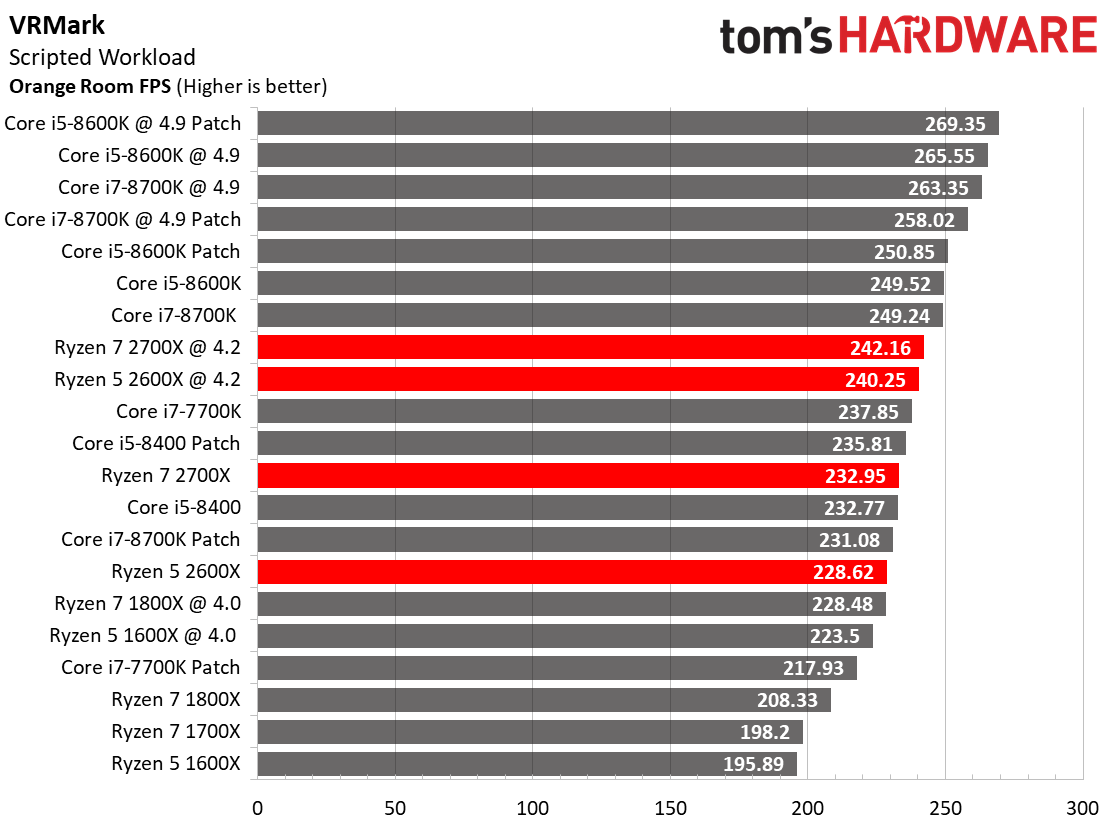
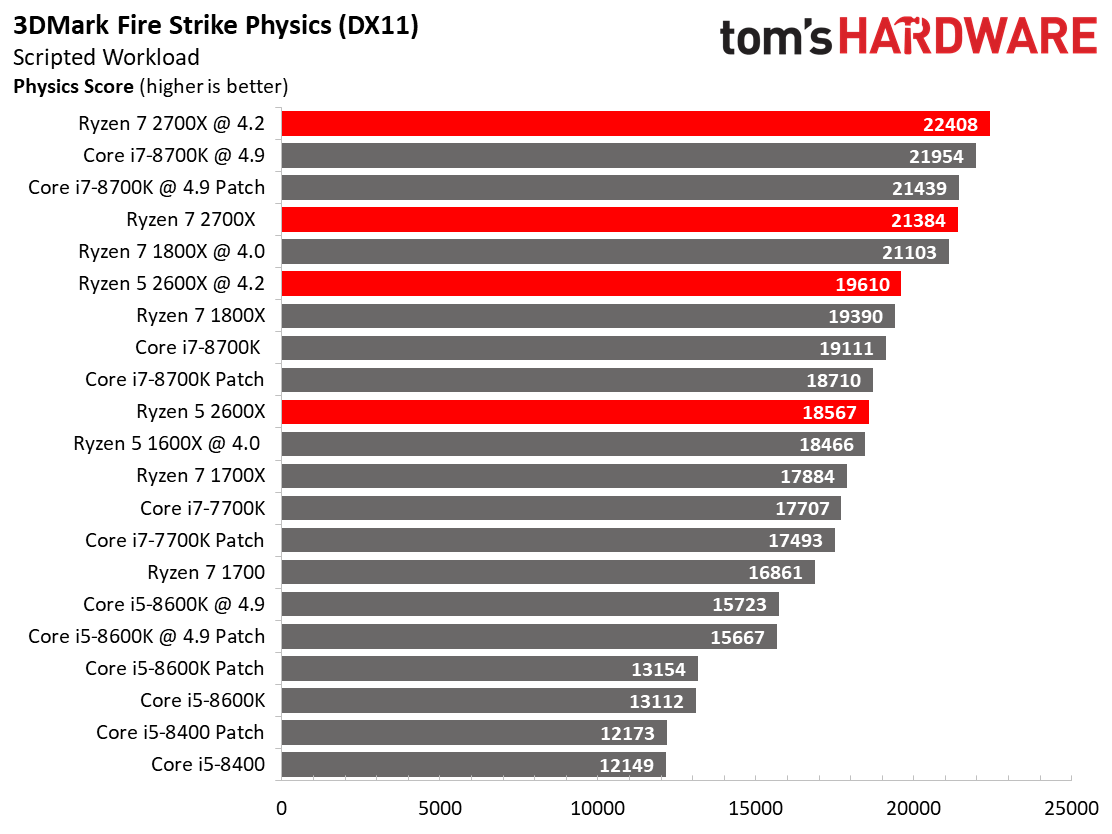
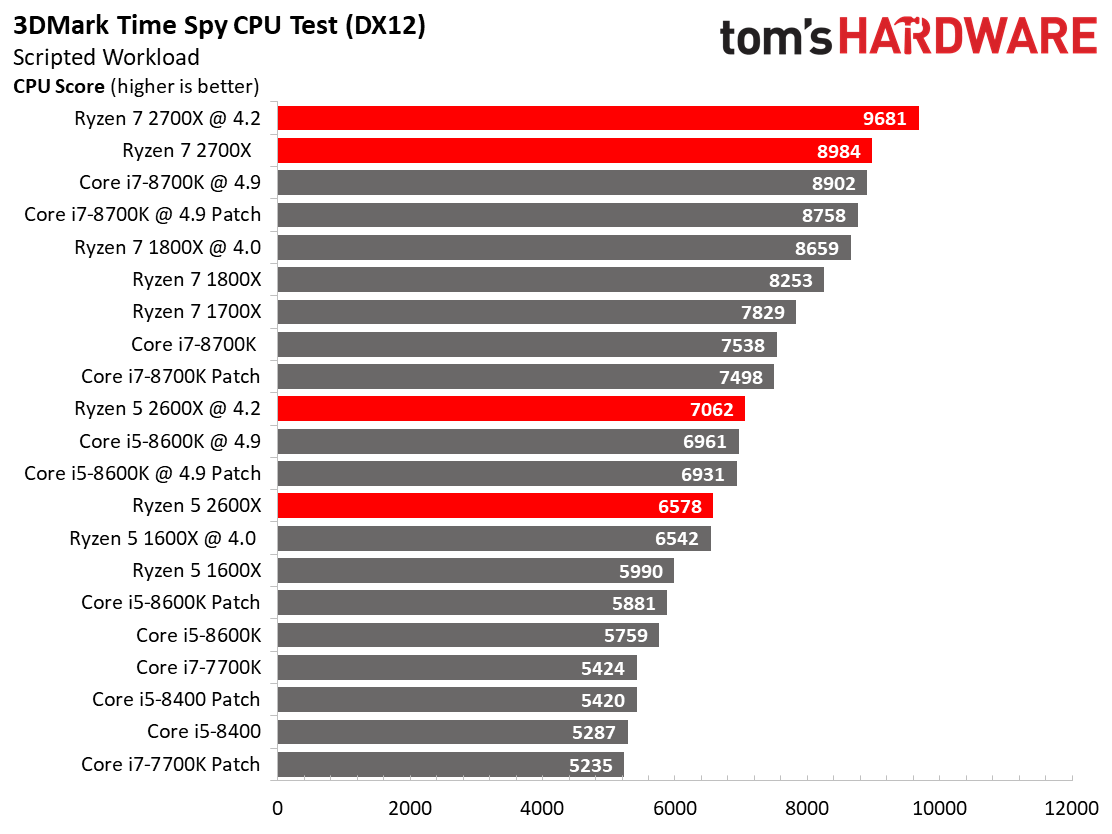
These are busy charts with the addition of our retested Intel platforms, including the Spectre Variant 2 microcode patches. At stock settings, the Ryzen 5 2600X outperforms its overclocked predecessor across the board, which is especially meaningful in the lightly-threaded VRMark workload. Overclocking yields significant gains in synthetic gaming benchmarks, which don't necessarily translate to the rest of our benchmark suite.
Several of the patched Intel processors do lose performance compared to before the updates. This is particularly apparent in VRMark on Intel's Core i7-8700K, while other tests reflect minimal regression. Meanwhile, the Core i5-8400 and -8600K give us mixed results. Core i7-7700K is a more representative measure of pre- and post-patch performance, and it takes a healthy dive in VRMark as well (verified several times by removing and reinstalling the OS-based Spectre patch).
Ashes of the Singularity: Escalation
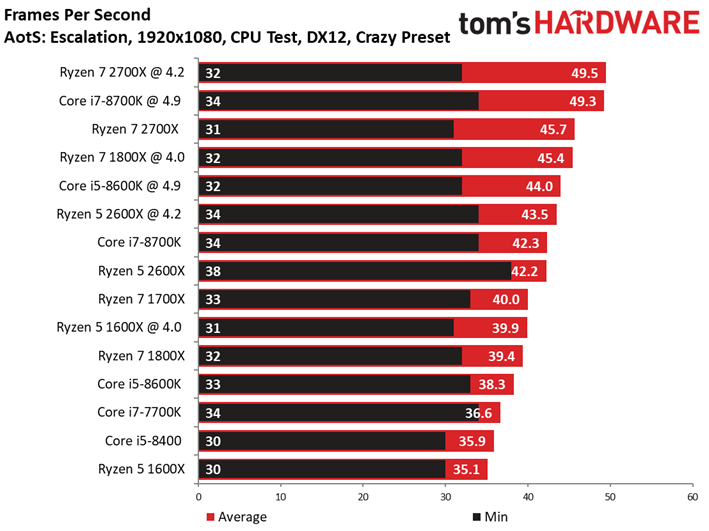
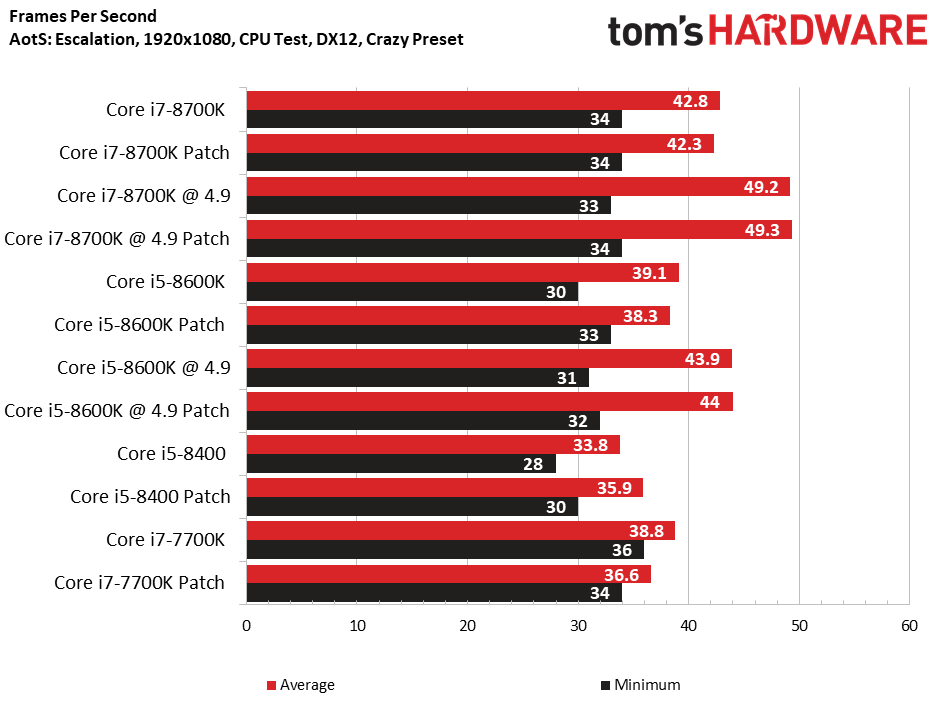
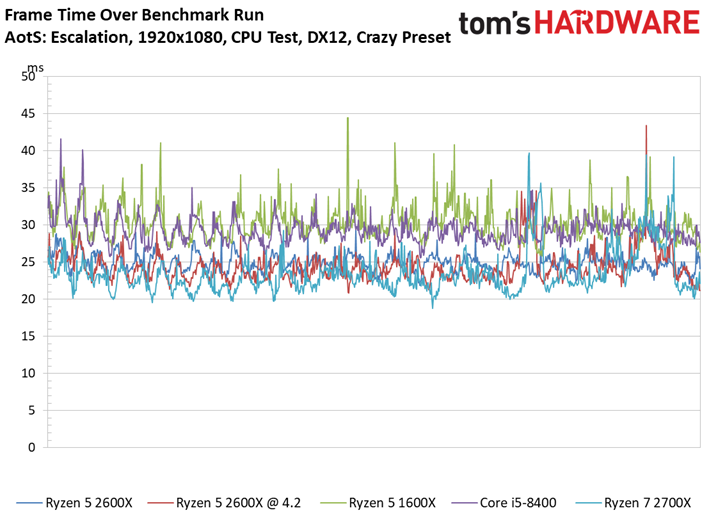
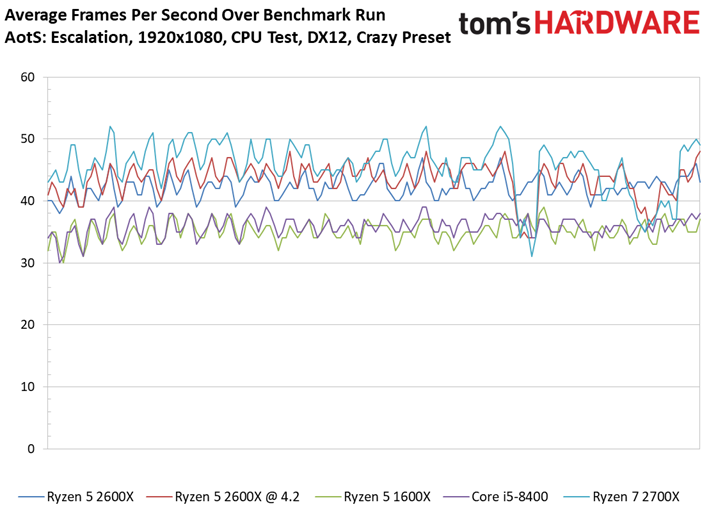
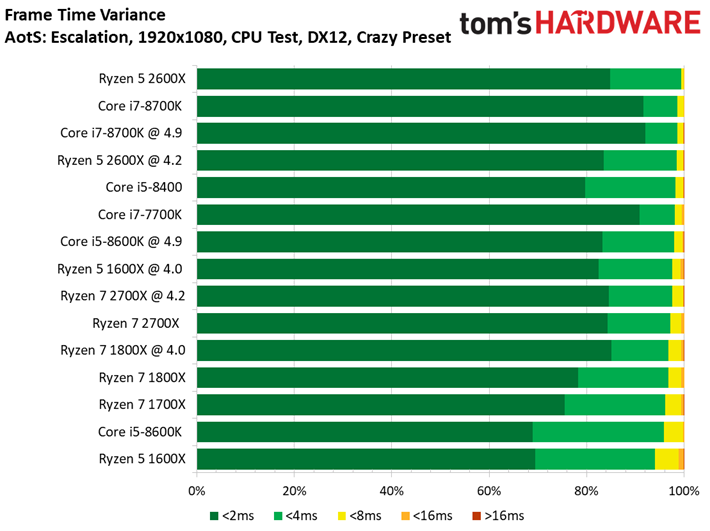
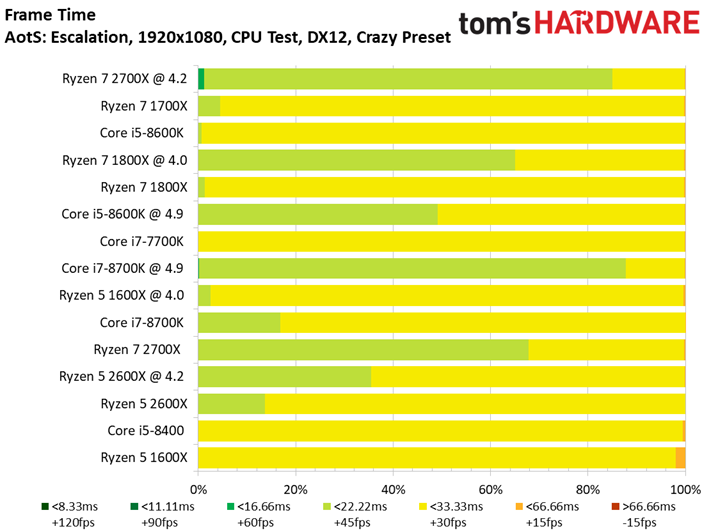
Ryzen 5 2600X is clearly superior to its predecessor in threaded titles. After all, the stock 2600X beats an overclocked 1600X. Those gains propel the Ryzen 5 up the chart, where it matches a stock Core i7-8700K.
Flip over to the album's next slide, which includes Intel CPUs before and after we patched their platforms. The Core i7-7700K loses a few frames per second in our retest, falling outside of this consistent benchmark's margin of error. Aside from the Core i5-8400's gains, which remind us that firmware updates sometimes fine-tune performance, too, most of the Intel CPUs land within the run-to-run variance we expect to see.
MORE: Best CPUs
MORE: Intel & AMD Processor Hierarchy
MORE: All CPUs Content
Get Tom's Hardware's best news and in-depth reviews, straight to your inbox.
Current page: VRMark, 3DMark & AotS: Escalation
Prev Page Patching Up, Overclocking & Test Setup Next Page Civilization VI Graphics & AI, Dawn of War III
Paul Alcorn is the Editor-in-Chief for Tom's Hardware US. He also writes news and reviews on CPUs, storage, and enterprise hardware.
-
nitrium Reply
??? Yes it destroys Intel's performance (not AMD's), but it's off by default in Windows and there is no reason to force it on.20922954 said:HPET.....
-
bbertram99 i was wondering if reviews will now be posting if they checked if it was on or not. I think they should since we don't always know when it being forced. Its not evident until you look. If they don't state its not forced on then we are left wondering.Reply -
toyo What's the point of this? Where's the GTX 1080ti? The 1080 simply result in every CPU being able to feed it enough data so scores are almost similar. Hence anomalies like having the 8400 or 8600k often being better than the 8700K, which should be impossible considering the higher clocks. I mean, this CPU performed the best for 3-4 months, even after Meltdown/Spectre patches/BIOS, and now it suddenly has issues competing with its own family of CPUs that are half that price, really?Reply
Then there's the gaming suite chosen. Old Far Cry? The 5th is out. Where's AC: Origins, notoriously CPU hungry? Overwatch? FFXV?
Hell, even the older Deus Ex or Kingdom Come: Deliverance would have made more sense to test CPUs.
But yes, this shows that for anything below 1080ti, you're good with pretty much all of these CPUs. Yet it doesn't tell the whole story, and soon a new GPU generation will be released, probably introducing many here to GTX 1080ti levels of performance, so testing with it does make sense. -
Paul Alcorn Reply20923085 said:i was wondering if reviews will now be posting if they checked if it was on or not. I think they should since we don't always know when it being forced. Its not evident until you look. If they don't state its not forced on then we are left wondering.
HPET has been disabled by default in Windows for a decade or so now. The OS can call on HPET if it needs it. The performance overhead of HPET is a known quantity, which is why the OS doesn't use it if possible.
We test without HPET disabled, which is enforced by our test scripts to ensure it stays that way. -
nitrium Reply
Agreed. I'm still using an i5 760 (@.3.4GHz) which was released in July 2010. I have had multiple GPU upgrades over the years (as of this moment I'm on an R9 390), so I also would very much like to know if a new CPU is as "future proof" as possible with regards to GPU upgrades.20923162 said:Yet it doesn't tell the whole story, and soon a new GPU generation will be released, probably introducing many here to GTS 1080ti levels of performance, so testing with it does make sense.
-
kilgor98 Would the 8700k cost what it does today without Ryzen? They would still be feeding us quad cores on the same 14nm process.Reply -
bbertram99 Don't see how to quote you PAULALCORN.Reply
Considering Anandtech got caught by the HPET bug and you never see it mentioned in any reviews until now. So now i question each review I have seen and will see unless in mentioned. The credibility of all benchmarks are in question unless it clear HPET is disabled. Good thing you script handles that, thank you for let me know.
Keep on providing great content, I've loved Tom's reviews for a LONG time. -
btmedic04 so can we expect updated benchmarks in the 2700x's review being that the results are skewed by the lack of specter patches on the intel processors?Reply -
Paul Alcorn Reply20923324 said:Don't see how to quote you PAULALCORN.
Considering Anandtech got caught by the HPET bug and you never see it mentioned in any reviews until now. So now i question each review I have seen and will see unless in mentioned. The credibility of all benchmarks are in question unless it clear HPET is disabled. Good thing you script handles that, thank you for let me know.
Keep on providing great content, I've loved Tom's reviews for a LONG time.
No one mentions HPET because it is disabled by default in the OS. If we listed every single feature that we leave alone and do not alter...that would be a long list :)